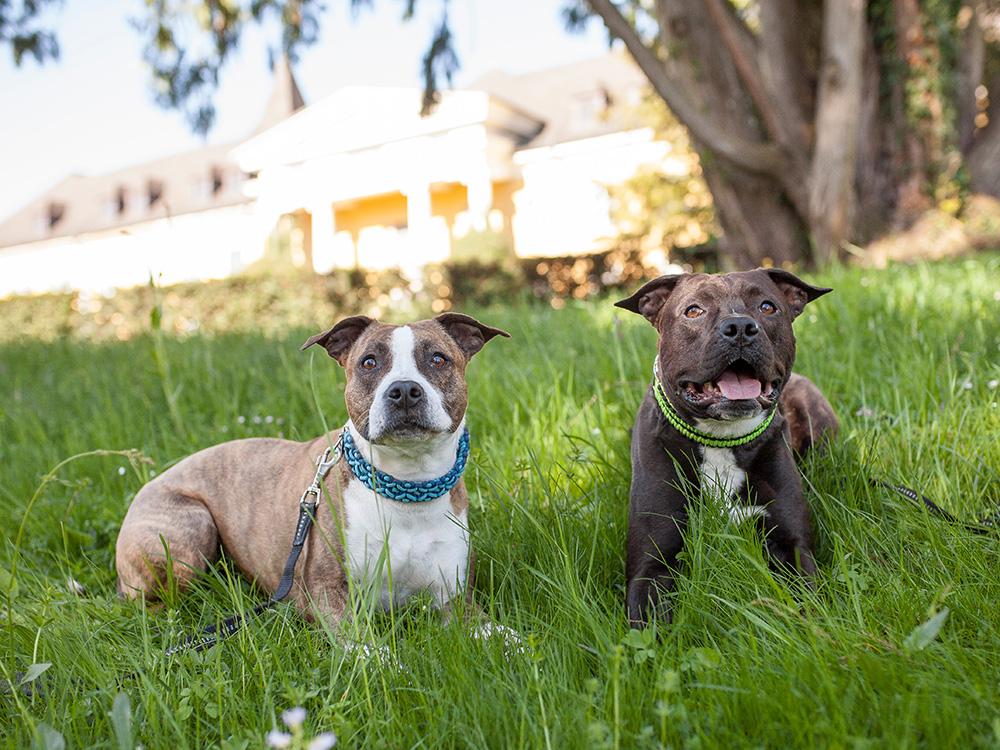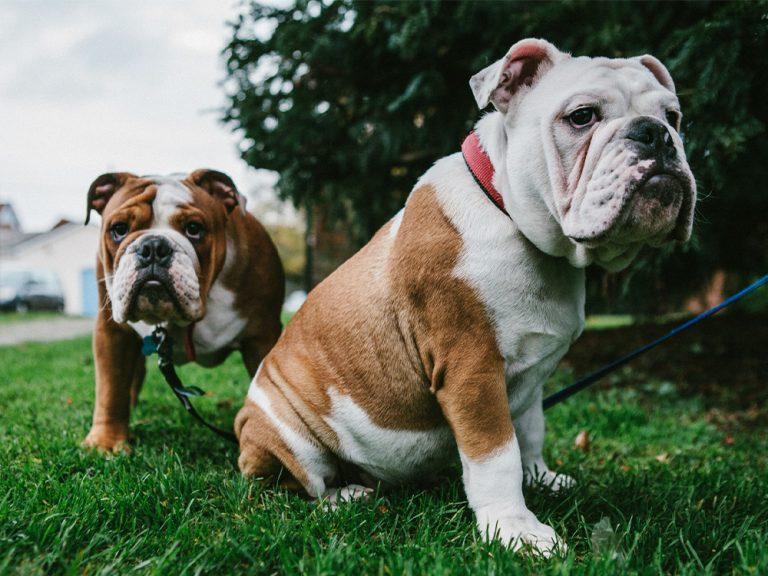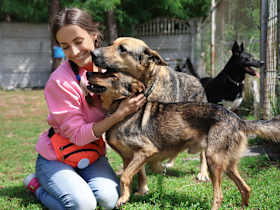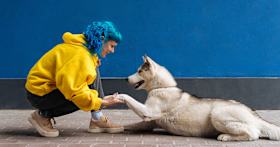Bully Breeds 101: Your List of Bully Breeds and Pitties
Meet the bully breeds who will melt your heart.
Meet the bully breeds who will melt your heart.
by Courtney Elliott, | February 28, 2025

Lichtflut / Shutterstock
Bully breeds are some of the most loyal, affectionate, and yet misunderstood dogs out there. Whether you’re considering adoption or just want to learn more about these incredible dogs, this guide will help you get to know them better.
While these bully breeds share some similar characteristics, each one brings their distinct charm, quirks, and personality to the table. From the compact and lovable Staffordshire Bull Terrier to the robust and athletic American Bulldog, there’s a bully breed for every dog lover out there. With the right care, training, and love, these dogs make amazing companions, proving that ‘bully’ is just a look — not a behavior.
To better understand our bully friends, let’s uncover the facts about bully breeds, the common characteristics they share, and why these loyal and loving pups are so often misunderstood.
Bully breeds are a group of dogs known for their muscular builds, broad heads, and loyal, affectionate personalities. The term “bully” comes from their shared ancestry with ancient Molossers, powerful working dogs bred for protection, herding, and companionship.
The terms “bully breed” and “Pit Bull” are often interchanged, but they’re not the same thing — one describes a group of dogs with similar characteristics and the other derives from the American Pit Bull Terrier breed. The term “Pit Bull” often gets thrown around haphazardly to describe any dog with a stocky, muscular build and short coat. It’s a commonly used catch-all term for any dog with Pit Bull-like features.
Temperament: Bullies are known for being affectionate and unconditionally devoted to their humans. Despite some unfair breed stereotypes proliferated by the media, pitties are gentle and patient in nature and make great family dogs.
Colors: When it comes to color and size, endless combinations make these big-hearted pups unique. The most common bully colors are black, brown, white, tan, gray, and brindle.
Size: Depending on the breed and sex of the dog, they can weigh anywhere between 24 and 120 pounds. If you’re looking for a lap-size bully, Staffordshire Bull Terriers are the smallest of the bunch. And while American Bulldogs are the biggest, they definitely think they’re lap dogs.
The five main types of bully breeds, often grouped together as Pit Bulls, are the American Bully, American Pit Bull Terrier, American Staffordshire Terrier, Staffordshire Bull Terrier, and American Bulldog. Let’s break down each of these adorable bully breeds to see how they differ in size, temperament, and personality.

alberto clemares exposito / Shutterstock
The American Bully is the newest addition to the bully breeds, first recognized as a breed by the American Bully Kennel Club (ABKC) in 2004. These pups are the life of the party — outgoing, happy, and confident. They’re known for their eagerness to please, making them quick learners and great candidates for training. These dogs need structure, socialization, and daily exercise from an experienced pet parent to keep their big brains and bigger bodies happy and healthy. If you need a friend who’s always up for a cuddle session or game of fetch, the American Bully’s got your back.
Height: 16 to 20 inches
Weight: 65 and 85 pounds
Health considerations: Due to unethical breeding practices, these poor pups are prone to a lot of health issues, such as heart disease, hip dysplasia, and arthritis.

Bill Anastasiou / Alamy Stock/ American Pit Bull Terrier
The American Pit Bull Terrier is all about personality and charm. Their happy-go-lucky nature makes them excellent family dogs, and their loyalty knows no bounds. They’re always ready to join an adventure or snuggle up on the couch. If you welcome an American Pit Bull Terrier into your home, you may notice a strong prey drive, so don’t be surprised if you catch them chasing all the things.
These athletic dogs are on the larger side of the bully breed group. These pups fall right into that sweet spot of being big enough to be sturdy playmates, yet compact enough for some serious cuddle sessions. Their short coats come in a variety of striking colors like black, brown, white, tan, or gray, giving them a unique look that matches their distinctive character. American Pit Bull Terriers are recognized by the United Kennel Club (UKC) but not the American Kennel Club (AKC).
Height: 17 to 22 inches
Weight: 30 to 66 pounds
Health considerations: Like any breed, they come with their own set of health considerations, so keep an eye out for issues like hip dysplasia, allergies, skin issues, and thyroid conditions.
Browse for American Pit Bull Terriers (and their mixes) for adoption

GROSSEMY VANESSA / Alamy Stock
With a big heart and a mellow personality, American Staffordshire Terriers are a popular pick for people looking for an endearing pittie friend. They love to love their humans and literally everyone else (so they may not make the best guard dogs for this reason). They’re known for being very sociable and especially safe around kids, and their confidence and high intelligence make them extremely trainable, so feel free to teach yours all the cool tricks.
Weighing in up to 70 pounds, you’ll find these pups in more than a dozen color combinations — in fact, they come in 18 standard colors, according to the AKC. While the American Staffordshire Terrier is recognized as a breed by the AKC, it is not recognized by the UKC.
Height: 17 to 19 inches
Weight: 38 to 68 pounds
Health considerations: Common Amstaff health issues that may crop up include skin and coat allergies, cardiac disease, and hip dysplasia.
Browse for American Staffordshire Terriers (and their mixes) for adoption

Alex Zotov / Shutterstock
Staffordshire Bull Terriers are the ultimate people pleasers. They’re known for being affectionate and devoted to their families, and they’re always up for some playtime or snuggles on the couch. But here’s the catch: These little darlings can be prone to separation anxiety, so it’s best if you have people around the house most of the time. Staffies may also prefer the spotlight all to themselves. They often shine brightest as the only dog in the house, reveling in all the attention and affection you can muster.
These pint-sized dogs typically weigh in at a range of 30 to 40 pounds, making them the smallest of the bully breeds. But what really steals the show is their distinctly large heads, giving them that adorable and oh-so-pettable bobblehead appearance. You won’t be able to resist giving them a head scratch or two.
Height: 13 to 16 inches
Weight: 23 to 46 pounds
Health considerations: Staffordshire Bull Terriers are prone to a few health conditions, including hip and elbow dysplasia, juvenile cataracts, patellar luxation, and allergies.
Browse for Staffordshire Bull Terriers (and their mixes) for adoption

Dominik Michalowski / Shutterstock
Often referred to as a gentle giant, the American Bulldog is known for their unwavering loyalty and affection. These athletic and outgoing pups thrive in an active household. Whether hiking, jogging, or playing a game of fetch, count them in for all the fun. American Bulldogs are easily recognizable by their shorter muzzles and deep, powerful chests, giving them a distinctive and rugged appearance. With a weight range of 60 to 120 pounds, they’re the largest of the Pit Bull breeds and make great guard dogs. Just make sure you socialize them from a young age so they don’t go into protection mode whenever they see another human outside your household.
Height: 20 to 28 inches
Weight: 62 to 118 pounds
Health considerations: American Bulldogs are generally very sturdy, robust, healthy dogs. Some potential health risks include hip and elbow dysplasia, juvenile cataracts, cherry eye, and thyroid issues.

kkgas / Stocksy
There are other dogs who fall under the bully breed classification but do not fall under the Pit Bull umbrella. These dogs are often described as strong, loyal, and affectionate companions with protective instincts and a deep bond with their people. While they share the muscular build and confidence typical of bully breeds, many have unique traits that set them apart.
English Bulldog: A stocky and low-energy companion who loves lounging and attention.
French Bulldog: Small but full of personality, Frenchies are affectionate, playful, and adaptable.
Bullmastiff: A gentle giant known for their protective yet affectionate nature.
Olde English Bulldogge: A more athletic and healthier take on the classic English Bulldog.
Boxer: An athletic, goofy, and endlessly loyal companion who is very high energy.
Cane Corso: An intelligent and powerful guardian with deep loyalty.
Dogo Argentino: A fearless yet loving breed originally bred for hunting and companionship.
Bull Terrier: A less blocky and more egg-shaped head breed with a mischievous personality.
Presa Canario: A strong, confident breed often used for guarding and farm work.
Absolutely, bully breeds can be wonderful additions to the family. They’re overflowing with love and loyalty. With proper care, training, and socialization, these pups can be the ultimate playmates — not only for kids but also for other furry pals in your household. Their warm hearts and affectionate spirits make them ideal companions.
No, bully breeds are not dangerous by nature. While they were originally bred for purposes like dog fighting and bull baiting, it’s essential to remember that they don’t come hardwired with aggression. Their temperament largely depends on factors like socialization, training, and the care they receive, which is the case for all dogs regardless of breed.
When it comes to temperament, bullies have proved their mettle. In fact, they performed remarkably well in one of the most extensive and comprehensive temperament tests conducted on dogs, coming second only to the sporting group. It’s also worth noting that the Centers for Disease Control and Prevention (CDC) emphasizes that a dog’s behavior primarily depends on responsible pet parenting rather than the breed itself. So in a nutshell, it’s not about the breed, but how they are nurtured and cared for that truly matters.
Being a responsible Pit Bull parent is similar to being a good pet parent to any dog: It’s all about setting them up for success with training, frequent vet visits, early socialization, adequate nutrition, and lots of exercise and affection. If you decide to adopt a Pit Bull breed, ask the rescue organization about their history so you can address any behavioral or health issues from the get-go.
It’s important to note that the term Pit Bull is often used broadly to describe any dog with similar features or characteristics. The widespread use of the term can lead to significant overreporting of aggression-related incidents involving dogs that may not actually belong to these recognized breeds. This inadvertently contributes to a false narrative surrounding Pit Bulls and bully breeds, suggesting that they’re inherently dangerous, when, in fact, their behavior depends on various factors like upbringing, training, and socialization.
By understanding the nuances of breed identification and focusing on responsible pet parenting, we can dispel these misconceptions and foster a more accurate and compassionate perspective towards our pittie pals.
Are Pit Bulls Different? An Analysis of the Pit Bull Terrier Controversy
Assessment of Canine Temperament in Relation to Breed Groups

Courtney Elliott, a proud Cleveland native living in Manhattan, blends her decade of writing and editing expertise with her unshakable devotion as a pet parent to her French Bulldog, Gus. When she’s not at her desk, you’ll find her frolicking in Central Park or engrossed in a good book at a local coffee shop.

Breed Info

Shelters & Rescue

Breed Info

Adoption Advice
Learn the many benefits of adopting a shelter dog, and why giving a dog a second chance at a home is truly rewarding.

Breed Info
A guide to the breeds who live for winter and don’t mind the frosty vibes.

Breed Info

Breed Info
Meet the dogs who, with a little trim, basically transform into living teddy bears.

Breed Info
Meet your ultimate sidekick with this list of companion dog breeds.

Breed Info
From bloodhounds to beagles, here's what to expect when you bring home a hound.

Breed Info
Far too many apartment dwellers think they can’t have a dog just because they rent. Read our guide to find your match.

Breed Info
Pedigreed pups are tied with mixed breeds for some disorders — but mutts reign supreme.

Breed Info
Plus, five things to know before adding one of these mixed-breed dogs to your family.

Breed Info
These mellow pups are here to match your homebody energy.



Breed Info
Are you thinking of adopting a dog that is easy to care for? Here is what it takes to keep them happy and healthy.